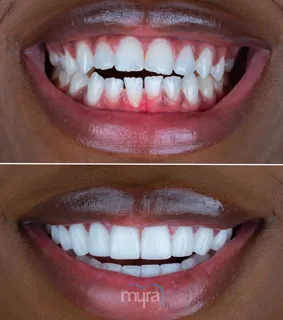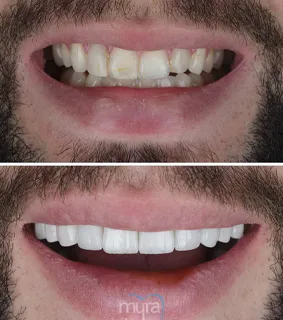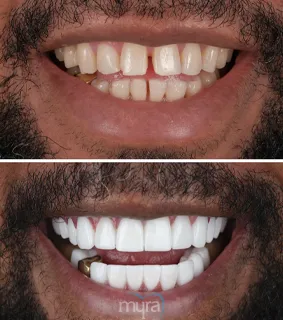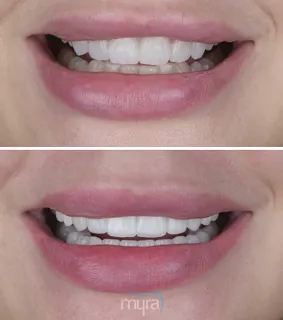Dental implants have arisen as an innovative and transformative remedy for those grappling with tooth loss within the domain of contemporary dentistry, effectively reinstating aesthetic appeal and oral functioning. Artificial dental implants serve the dual purpose of providing a stable base for prosthetic teeth and reinstating a heightened level of self-assurance and physical ease. The increasing prevalence of dental implants necessitates a comprehensive comprehension of their financial implications, enabling individuals to make well-informed choices regarding their oral health and general welfare.
The term "dental implant" refers to a surgical component that is inserted into the jawbone to support a dental prosthesis, such as a crown, or bridge. A dental implant is an advanced prosthesis that is intricately engineered to replicate the anatomical and physiological characteristics of natural teeth. The dental implant procedure involves the insertion of a titanium post into the jawbone through a surgical procedure. An abutment and crown are placed on the post to complete the implantation process.
The amalgamation of these components yields a tooth prosthesis that exhibits robustness and longevity, closely emulating the visual and functional characteristics of a natural tooth. Dental implants are distinguished by their ability to provide a durable and enduring solution, characterised by enhanced strength, cosmetic appeal, and the maintenance of jawbone health, in contrast to conventional alternatives like dentures and bridges.

The cost of dental implants is impacted by several factors, with each factor contributing to the financial commitment associated with this transformational dental operation. These factors encompass various considerations, including the location of the dental practice, the expertise of the dental professionals involved, the number of implants required, the complexity of the surgical procedure, the materials utilised, and the presence of any additional treatments. These additional treatments include bone grafting or sinus lifts.
The selection of the restoration placed on the implant, such as a single crown, bridge, or denture, plays a substantial role in determining the expense. The complex interaction of factors highlights the necessity of comprehending the diverse cost concerns involved in dental implant procedures.
The cost of dental implants varies significantly based on the aforementioned aspects. Acknowledge that dental implants constitute a significant expenditure towards an individual's oral well-being and standard of living. The initial cost associated with dental implants is sometimes overshadowed by their enduring advantages, which encompass greater efficacy, improved articulation, heightened self-confidence, and the avoidance of future oral health concerns stemming from untreated tooth loss. Gaining a comprehensive understanding of the wider scope around the financial implications of dental implants empowers individuals to make informed choices that are congruent with their oral health objectives and personal situations.
What is a dental implant?
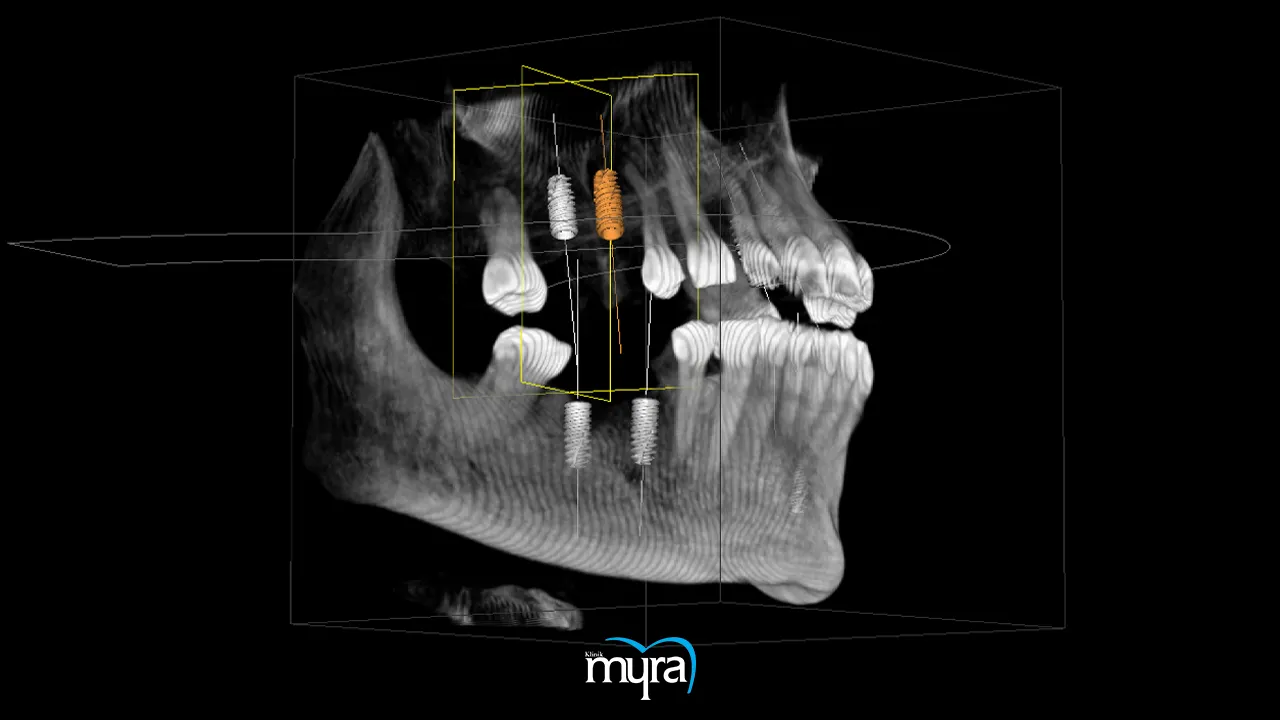
A dental implant is a complex dental prosthesis used to replace lost teeth with an artificial tooth that is both functional and aesthetically beautiful. A dental implant is made up of three basic parts such as the implant, an abutment, and a crown.
The dental treatment implant is a tiny post that is surgically implanted into the jawbone, thereby replacing the natural tooth root. It is normally made of biocompatible titanium. The implant integrates with the jawbone through a process known as osseointegration, creating a sturdy and secure basis for the replacement tooth. The implant is then connected to an abutment, which protrudes above the gum line and serves as a link between the implant and the final restoration.
The crown is mounted to the abutment after being custom-made to match the patient's existing teeth in shape, colour, and size. The visible section of the dental implant closely resembles a natural tooth and restores the missing tooth's appearance as well as functioning. Dental implants have various benefits, including improved chewing and speaking stability, stimulation to prevent jawbone atrophy, and a long-lasting, robust solution. A dental treatment implant has become a popular choice for those seeking a permanent and dependable method of restoring their smile and maintaining optimal oral function, whether replacing a single tooth, numerous teeth, or a complete dental arch.
How much does a Dental Implant Cost?
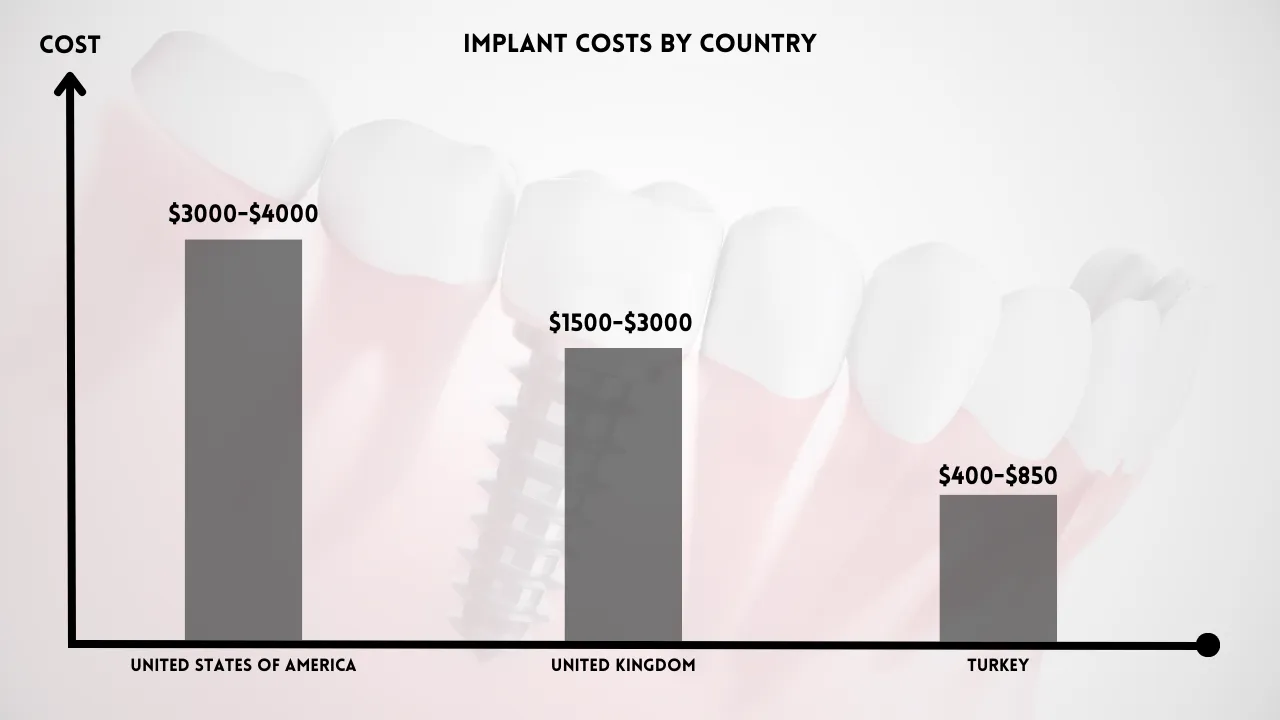
A single-tooth implant costs anywhere from $3,000 to $4,000 in the United States. The price covers the surgery and location of an implant, but the abutment and crown that go on top of the implant cost extra. A person who needs a full set of implants pays between $60,000 and $90,000 in the end.
A single tooth implant costs anywhere from £1,500 to £3,000 or more in the UK. The price range is affected by different things, and it is important to ask the dental centre for a breakdown of costs. A full set of teeth are replaced with dental implants and a fixed bridge for about £18,060. It includes £7,800 for 4 implants and £10,260 for a full bridge with 12 teeth. The cost of dental implants in Turkey is often lower than in other countries. A single tooth implant costs £400. Full mouth dental implants in Turkey prices start from £3200 to £7800 with Osstem dental implants.
What are the factors that affect dental implant cost?
The factors that affect dental implant costs are listed below.
- Insurance Coverage: Dental insurance partially covers the cost of dental implants, but coverage varies widely. Some plans cover certain aspects of the procedure, while others do not cover it at all.
- Geographic Location: Dental care costs vary based on the city or region. Urban areas or areas with a higher cost of living tend to have higher dental implant costs.
- Implant Material: The type of implant material used impacts the cost. Titanium implants are commonly used, but there are premium options like zirconia, which are more expensive.
- Anesthesia and Sedation: The type of anaesthesia or sedation used during the procedure contributes to the cost.
- Follow-up Appointments: Dental implant procedures require multiple follow-up appointments for assessment, adjustments, and placing the final restoration. These appointments add to the total cost.
- Additional Treatments: Additional treatments add to the overall cost if procedures like bone grafting or sinus lifts are needed to improve the jawbone's condition.
- Surgical Fees: The fees charged by the oral surgeon or implantologist for their expertise and services are a significant part of the cost.
- Type of Implant Used: Different implant systems with varying features and technologies have different costs. Premium brands have higher costs.
- Number of Implants Needed: The more implants needed for the restoration, the higher the cost. Some cases require a single implant, while others involve multiple implants.
- Location of Implant: The placement of the implant, whether in the upper or lower jaw, impacts the complexity of the procedure, which affects the cost.
1. Insurance coverage
Insurance coverage has a big effect on the cost of dental implant treatments because it determines how much of the cost the insurance company covers and how much the patient has to pay out of pocket.
Insurance coverage is the cost of a dental insurance plan to pay for or reimburse the cost of a dental implant treatment. There are a lot of differences between dental insurance plans in terms of what treatments they cover and how much. Some plans cover dental implants in full or in part, while others do not cover them at all. Reviewing the terms, conditions, and coverage limits of the insurance policy helps to figure out how much of the dental implant cost is paid by insurance.
The amount that one has to pay out of pocket for a dental implant treatment varies based on whether the insurance covers it. People are unlikely to have to pay as much out of pocket if the insurance pays for much of the treatment. Pay a bigger portion of the costs if the insurance does not cover dental implants or only covers them partly. Patients must know what their insurance does not cover and how much they have to pay out of pocket for care.
Remember that the insurance covers certain parts of the process, like the surgery to put the implant in place or the restoration such as the crown, bridge, or denture that goes on top of the implant. Coverage is different for each step of the process.
Insurance does not cover all the treatment, especially if some of it is for looks or a choice. For example, they have to pay the extra cost out of pocket if a patient picks a high-quality restoration material that is not considered medically necessary.
2. Geographic location
Geographic location affects the price of dental implants because of differences in the cost of living, the economy, and the way the market works. A dentistry clinic or practice is said to be in a certain area or region if it has a geographic location. Living costs, economic situations, and market dynamics are different in different parts of a country or around the world. Prices for dental treatments, like dental implant procedures, are affected by these things.
The cost of life and the economy are very different from one place to another. Dental practices tend to have higher operating costs in places with higher costs of living, like big cities or wealthy areas. It includes rent, utilities, and staff pay, among other things. Dental offices in these places have to charge more to pay their costs. Dental offices in areas where the cost of living is lower have lower overhead costs, which helps them to offer dental implant procedures at a lower price.
The way the market works plays a role. Prices are higher because there is more competition for services in places where there is a lot of demand for dental implant procedures but not a lot of skilled professionals. Prices are more competitive in areas where more dentists are giving similar services.
Patients must think about where a dental office is when studying and comparing prices since prices vary a lot from region to region. Weigh how much money to save by going somewhere else for the treatment against how easy and close a local dental office is to get to.
3. Implant material
Implant material is the material that is used to make the tooth implant post. Titanium is the most common material for tooth implants because it works well with the body and fuses with the jawbone. There are other materials, like zirconia, that are used for tooth implants.
The choice of dental implant materials has an impact on the cost of the dental implant procedure. Titanium implants are the most used and established implant material. Titanium implants are known for their biocompatibility, durability, and successful osseointegration. The cost of manufacturing and using titanium implants is well-established in the dental industry, making them a relatively more affordable option.
Zirconia implants are an alternative to titanium. Zirconia implants are favoured for their tooth-like appearance and potential to appeal to patients with metal sensitivities. Zirconia implants tend to be more expensive to manufacture, and the technology and techniques required for their placement are developing, resulting in higher costs compared to traditional titanium implants.
Some dental implant systems use high-quality materials that have specific benefits, like better looks or faster integration. They often cost more because more study, technology, and materials go into these high-end options.
The choice between implant materials must be made in consultation with the dentist or oral surgeon, considering the individual needs, preferences, and any potential sensitivities. Prioritise the material that offers the best long-term success and oral health for the situation, while implant material influences costs.
4. Anaesthesia and sedation
Anaesthesia and sedation are medical techniques used to manage pain and anxiety during dental procedures. Anaesthesia and sedation help patients remain comfortable and relaxed during treatments that otherwise are uncomfortable or stressful. Anaesthesia involves numbing specific areas of the mouth, while sedation induces a state of relaxation and reduced awareness.
There are different types of anaesthesia and sedation, from local anaesthesia, which numbs the treatment area, to conscious sedation, which makes one feel relaxed but keeps a person awake, to deep sedation or general anaesthesia, which makes a patient unconscious. The cost depends on how complicated the method of sedation is. For example, general anaesthesia is usually more expensive than local anaesthesia, which is given by a doctor.
An anesthesiologist or nurse anaesthetist must be present to give and monitor the sedation during the operation when deeper levels of sedation or general anaesthesia are used. Costs go up because an anesthesiologist or nurse anaesthetist has specialised knowledge and because more people are needed.
Some levels of sedation, such as general anaesthesia, require special facilities and tools to keep an eye on the patient's vital signs and make sure they are safe. Costs go up because of these extra tools. Some types of sedation make the process take longer because the patient requires more time to come out of it before being sent home. It changes how much the treatment costs.
Anaesthesia and sedation help the patient feel more comfortable and calm, which makes the process easier to handle. The prices for these services show how much they add to the patient's experience.
5. Follow-up appointments
Follow-up appointments are the visits a patient has with their dentist after the initial dental implant process. These appointments are required to check on the healing process, see how well the implant has fused with the jawbone, and make any adjustments or changes that are needed.
The number of follow-up appointments depends on how well the person is improving, how complicated the case is, and how the dentist plans to treat them. Cases that are longer or more complicated need to be checked on more often.
Follow-up visits require the time and expertise of a dentist to check on the progress of the implant, look for any problems, and make sure the tooth is healing properly. The expert time is taken into account in the price. X-rays or other diagnostic images are taken to check on how well the implant is settling in at some follow-up meetings. Imaging treatments like these add to the total cost.
Dentists require extra processes or materials, which raise the cost of changes or adjustments that need to be made during the healing process. Follow-up meetings not only let a person check on the implant, but they give a chance to get preventive care and help if any problems come up early. It makes the implant work better and last longer as a whole.
Follow-up appointments add to the cost because they use the dental facility's resources, such as staff time, tools, and utilities. Go to any follow-up visits that the dentist suggests. These visits help make sure that the dental implant works well, find any problems early on, and allow for quick fixes. Follow-up appointments do add to the total cost, but they are very important to the long-term health and function of the implant, which is a big factor when figuring out how much the whole operation costs.
6. Additional treatments
Additional treatments refer to any extra procedures or steps that are needed before, during, or after the implant placement to make sure the implant works and the patient's oral health as a whole. Some of these treatments are bone grafts, sinus lifts, and treatments for the gums.
There are patients who have issues with their jawbones that need to be fixed with procedures like bone grafting. These extra treatments make the entire process more complicated and specialised skills, materials, and equipment, add to the cost.
Treatments like bone grafting are needed to build up the bone structure when the jawbone isn't tall enough or dense enough to hold an implant. The total cost of the medicine goes up because of these steps.
Gum health and proper soft tissue management are crucial for successful implant integration. Patients requiring treatments to improve gum health or ensure proper soft tissue support incur additional costs.
There are treatments, like bone grafting, that need special materials or equipment. These products and tools add to the cost as a whole. Some extra treatments need knowledge and skills that are not common. There is a need for specialists like periodontists or oral surgeons, whose skills make costs go up. Adding more treatments makes the whole process take longer, which means more meetings and resources, which leads to higher costs.
Extra treatments add to the initial cost of a dental implant process, but they often play a key role in making sure the implant stays stable and works well in the long run. Patients must work closely with their dentist to figure out if any extra treatments are necessary and how much they cost. A full treatment plan that includes all the steps needed to take to get the result wanted and keep the mouth healthy.
7. Surgical fees
Surgical fees are the costs that come with the surgery part of getting a tooth implant. These fees pay for the work done by the oral surgeon or implantologist who puts the implant into the jawbone during surgery.
Oral surgeons and implantologists have special training and knowledge to do tooth implant surgeries. The skill and knowledge of oral surgeons and implantologists make the procedure better and more likely to work. The professional skills of oral surgeons and implantologists are reflected in their surgical fees.
The surgery needs careful planning, exact placement of the implant, and attention to detail. The cost of surgery takes into account how long and hard each step takes. Oral surgeons often use cutting-edge technology and specialised tools to make sure that implants are placed correctly, and that patients do not feel too much pain. Surgery costs go up when these tools are used.
Make sure the surgery area is clean and sterile to keep infections from happening. The general fees are affected by the costs of keeping the surgery area clean and safe. The costs of those things are covered by the surgery fees if the surgery requires anaesthesia or sedation.
The cost of surgery includes post-operative care, such as follow-up meetings to check on the patient's recovery and deal with any problems that arise. The use of the surgical facility, including the staff, tools, and utilities, adds to the general cost of the surgery.
Surgical fees are a part of the total cost, they reflect the expertise, resources, and specialised care that are used during the surgical part of the dental implant process. Work with a skilled and experienced oral surgeon to make sure the implant works and stays in place for a long time. A patient must think about the level of care and the credentials of the surgeon when figuring out how much surgery costs.
8. Type of implant used
The type of implant used is the system, brand, or design of the implant that was chosen for the dental implant process. The features, methods, and materials of different implant systems affect how well they work and how much they cost.
Research and development is often a big part of making implant systems with advanced features and technologies. Prices go up because of the costs that come with new ideas and improvements. There are implant systems focused on using high-quality materials, precise production methods, and strict quality control. Costs are higher than with simpler implant systems because of these things.
Premium implant systems have a higher success rate and last longer because of how they are made and what they are made of. These things make up for their higher prices by giving better results and making complications less likely. Some implant systems change things like the way they look or how the abutments fit. These features add to the total cost, but they are helpful for patients who want a more customised product.
Well-known and well-established implant brands often charge more because they have a good track record, are reliable, and have a well-known brand in the dental business. High-end types of dental implants come with extra support, warranties, or promises that make up for their higher prices. Dentists need to go through training and education to use specialised implant systems correctly. The general cost is affected by the costs of these specialised skills.
Patients and their dentists must work together closely to find an implant system that fits their wants, expectations, and budget. Patients must think about how these features help them in their particular case, even if more expensive implant systems have more features.
9. Number of implants needed
The number of implants needed refers to the quantity of dental implants that are required to restore the patient's missing teeth. A patient needs a single implant, multiple implants, or even a full set of implants for an entire dental arch depending on the extent of tooth loss and the treatment plan.
Putting in more than one implant or a full range of implants is harder than putting in just one. The greater complexity of surgery means that more time, expertise, and resources are needed, which drives up costs. The implant post, abutment, and repair are all parts of each implant. The general cost goes up if more implants are needed because more materials and parts are needed.
Laboratory work is needed to make unique restorations such as crowns, bridges, and dentures that are attached to the implants. The cost goes up because there is more work to do in the lab when there are more implants. Putting together a treatment plan for multiple implants takes a lot of planning and organisation. It requires the dentist's skill and makes the total cost of the treatment go up.
Go to more follow-up visits to check on the healing and make sure each one works when getting more implants. The total cost goes up because of these extra meetings. Cases with more than one implant need more customization and aesthetic factors for a seamless and natural-looking result. It changes how much supplies and lab work cost.
Patients must work closely with their dentist to figure out how many implants they require for their particular situation. Put the best treatment result and long-term mouth health first, even if the cost goes up with more implants. Choosing the right amount of implants makes dental implant restoration work better, and look better.
10. Location of implant
The location of the implant refers to the specific area within the mouth where the dental implant is placed. There are different levels of difficulty and access to different parts of the mouth, which affect how much the whole dental implant process costs.
Some parts of the mouth are harder to work on because they are close to nerves, glands, or other teeth. Putting implants in these places requires more care, knowledge, and safety precautions, which raise costs. Do a procedure like a sinus lift to make enough bone volume. These extra steps during surgery make the process harder and cost more.
The size and shape of implants used in different parts of the mouth are different. Some parts of the body need specialised implant designs, which raise or lower the total cost. The type of repair such as crown, bridge, or denture that is put on an implant depends on where it is. Some repairs need more customization or supplies, which raise or lower the cost.
Implants that are put in certain places require more intense follow-up care to make sure that they heal and integrate well. It leads to extra costs and meetings. The options of anaesthesia or sedation are different depending on where the implant is. Deeper amounts of sedation are needed in some places, which adds to the cost.
Is dental implant maintenance expensive?
Yes, dental implant maintenance is expensive. There are costs to think about, even keeping up with tooth implants is not as expensive as getting them put in. Dental implants must be taken care of regularly if they are to last and work well. The care includes regular dental checkups, professional cleanings, and regular checks on the health and security of the implants. These visits help find and fix problems early on, which keep them from getting worse in the future.
Maintenance for dental implants costs different amounts, based on things like the complexity of the case, the need for extra treatments, the number of implants, and the dental office. Remember that maintenance costs are less than the cost of getting the implants in the first place and are an investment in the health and usefulness of the implants in the long run. Regular checkups help to escape more expensive treatments that are needed if problems are not found or treated in time.
Does insurance cover dental implants?
Yes, insurance covers dental implants. Dental insurance covers dental implants in a lot of different ways, based on the plan and the policy's specific terms and conditions. There are more dental insurance plans that have started to cover dental implants in some way. Dental implants are now valuable and often important treatments for oral health and overall health.
Coverage is not complete and is very different from one plan to the next. Some insurance plans cover the surgery placement of the implant, while others cover the restoration such as the crown, or bridge that is put on top of the implant. There are limits on the amount of coverage, yearly maximums, waiting periods, and conditions that are not covered if they were already there.
Are there any risks in having a dental implant?
Yes, there are risks in having a dental implant. There are risks and complications that patients must be aware of, while dental implants are considered safe and have a high success rate, like any medical procedure. Some risks associated with dental implants include infection, implant failure, nerve damage, bone loss, sinus issues, gum recession, allergic reactions, and implant mobility. These risks underscore the importance of thorough assessment, proper planning, and post-operative care but relatively rare.
Dental professionals carefully evaluate patients' medical history, oral health, and suitability for the procedure to mitigate dental implant side effects. Patients are provided with detailed aftercare instructions to minimise the chances of dental implant side effects. The majority of dental implant procedures are successful and lead to improved oral health and function. Patients must engage in open discussions with their dental professionals to fully understand their individual risk factors and make informed decisions about the procedure.
How to choose the best dental implant clinic?

To choose the best dental implant clinic, start by conducting thorough research and seeking recommendations from sources like regular dentists, friends, family, or colleagues who have undergone similar procedures. Investigate the qualifications and experience of the dental professionals at the clinic, focusing on their expertise in dental implant procedures. Reading online reviews and patient testimonials provides insights into the clinic's reputation and patient satisfaction.
Consider their technological advancements and facilities when evaluating potential clinics. Modern equipment contributes to a smoother and more effective procedure. Look for clinics with accreditations and certifications from reputable dental associations, as these indicate a commitment to maintaining high standards of care. Arrange a consultation with the clinic to discuss the specific needs and treatment plan. The interaction allows a patient to assess the professionalism of the staff, the clinic's communication, and personal comfort within the environment.
Inquire about the available treatment options, considering the advantages and disadvantages of each approach in relation to the unique oral health needs during consultation. Ensure that the clinic provides transparent pricing and a clear breakdown of the costs associated with the procedure. Ask about their post-operative care and follow-up procedures, as ongoing monitoring and aftercare are crucial for a successful outcome.
What is the best dental clinic for dental implants?

The best dental clinic for dental implants involves considering several factors. Pay attention to the qualifications and experience of the oral surgeons or implantologists who work at the centre. Make sure they have specialised knowledge of how to put in dental implants. Learn about the experiences of past patients and the level of care as a whole by reading reviews, testimonials, and online ratings about the clinic.
Accreditations from well-known dental groups show how committed the clinic is to keeping standards high. A dental implant treatment is more likely to go well in a modern clinic with up-to-date equipment and technology. Look for clear pricing, treatment options, and ways to talk to the clinic. A good clinic must be ready to give clear information and answer questions.
A patient-centred approach is shown by a clinic that makes treatment plans based on unique oral health needs and goals. A meeting with the clinic is important because it gives a chance to talk about the case, ask questions, and get a feel for how professional the clinic is and how it treats patients.
The best clinic varies based on individual preferences, location, and budget. Find a dental clinic for dental implants that meets patient needs and expectations by doing a lot of research, getting suggestions from trusted people, and talking to dental professionals.
Is it cheaper to have dental implants in Costa Rica and Turkey compared to other countries?
Yes, it is cheaper to have dental implants in Costa Rica and Turkey compared to other countries. Costs for dental implants are cheaper in Costa Rica and Turkey than in many other places, especially in places where living costs are higher. Cheaper prices are often due to factors such as lower labour costs, reduced overhead expenses, and different economic conditions in these countries.
Dental implant procedures and other dental treatments are less expensive for people who choose to get their dental care in these countries. Do a lot of research about Costa Rica vs. Turkey Dental Treatment: Prices, Pros and Cons and think about things like the qualifications of the dentists, the quality of the facilities, and the cost of travel when deciding whether to get dental implants abroad.
Are dental implants as expensive as dental veneers?
No, dental implants are not as expensive as dental veneers. Dental implants cost more than dental veneers. Dental implants are artificial tooth roots and crowns that are put in place of lost teeth through surgery. The implant, the abutment, and the final repair are all put in place in the process. The full treatment takes place in several steps and requires the skills of oral doctors or implantologists.Dental veneers are thin shells that are put on the front of teeth to make them look better in the process. They are less complicated to put on than dental implants. The cost of dental veneers changes based on things like how many veneers are needed and what materials are used. Dental implants are seen as a more complicated and involved treatment choice than dental veneers, which makes them cost more.






